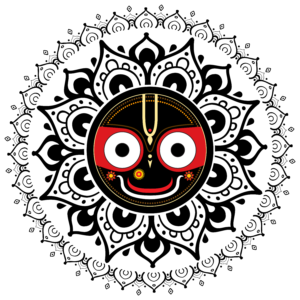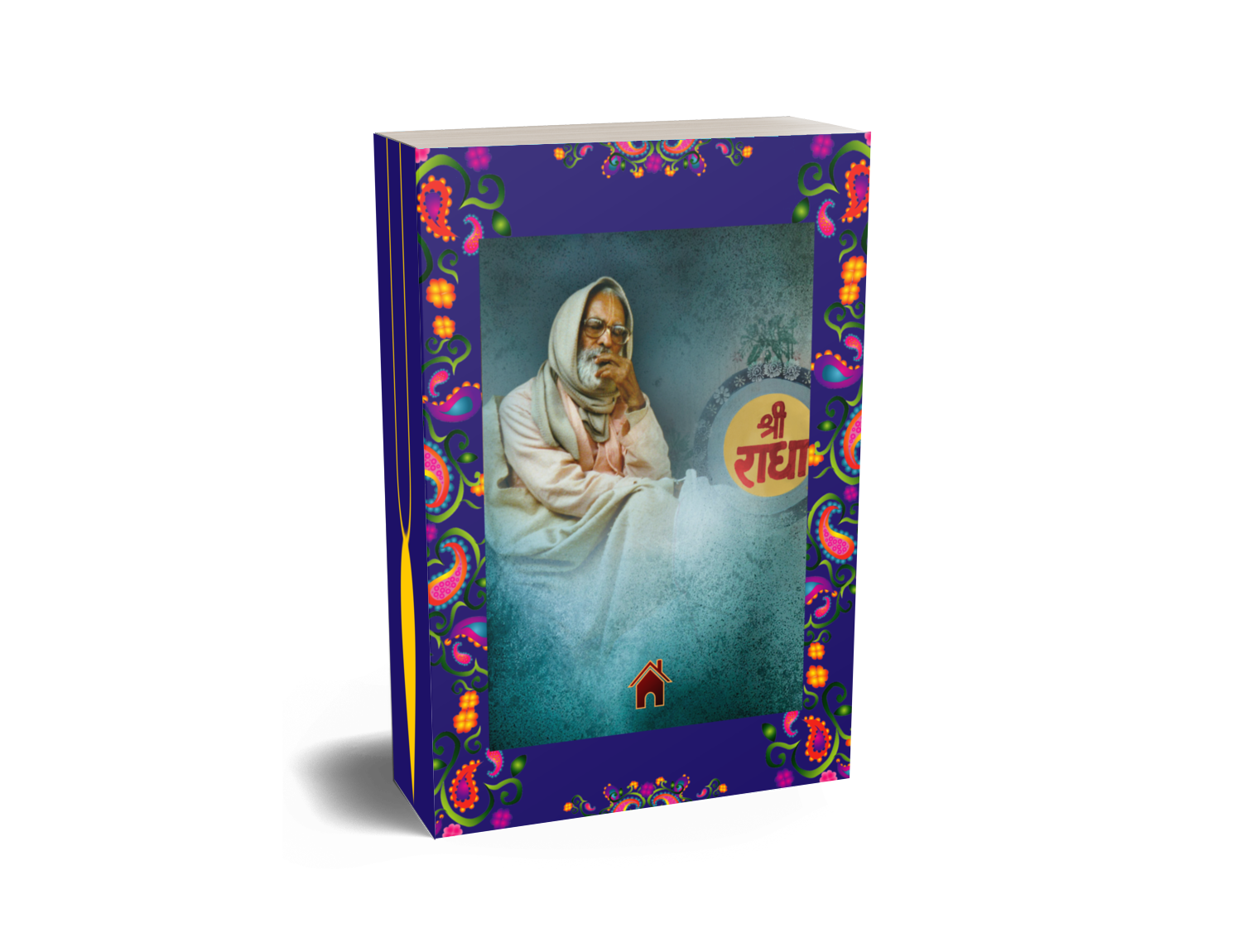

Chapter Thirteen from the book Bhakti-rasāyana, 4th edition by Śrīla Bhaktivedānta Nārāyaṇa Mahārāja
sva-mātuḥ svinna-gātrāyā
visrasta-kabara-srajaḥ
dṛṣṭvā pariśramaṁ kṛṣṇaḥ
kṛpayāsīt sva-bandhane
Śrīmad-Bhāgavatam (10.9.18); Bṛhad-bhāgavatāmṛta (2.7.129)
[Because of mother Yaśodā’s hard labour, her whole body became covered with perspiration, and the flowers and comb were falling from her hair. When child Kṛṣṇa saw His mother thus fatigued, He became merciful to her and agreed to be bound.]
When Kṛṣṇa saw Yaśodā labouring so desperately that her whole body was dripping with perspiration and the flower garland that was entwined in her hair braid was falling down, He mercifully allowed Himself to be bound by her.
Sanātana Gosvāmī says that in describing the life of Yaśodā, Śukadeva Gosvāmī became joyful and astonished. 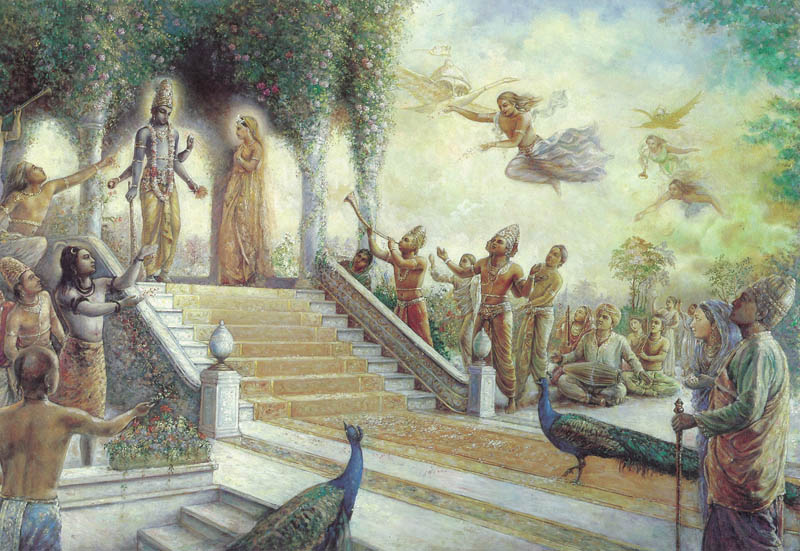 The vātsalya of Yaśodā is more special than anyone else’s and even more special than Nanda’s because Kṛṣṇa is not completely overpowered by anyone else’s parental affection the way He is by hers. Kṛṣṇa is the one who unties the bindings of this material universe, even for those who approach Him in the mood of an enemy. He is the giver of the five types of mukti, liberation: sālokya (residing on the same planet as the Lord), sāmīpya (becoming His personal associate), sārūpya (obtaining a spiritual form similar to His), sārṣṭi (obtaining opulence similar to His) and sāyujya (merging into His effulgence). Over and above these He gives the special type of liberation known as prema. That prema He gave even to Pūtanā, who approached Him in the guise of a mother to kill Him. She was given a motherly position in Goloka even though she was an enemy, and her relatives Aghāsura and Bakāsura, even though they were also enemies, were given sālokya. Yet here we find that very giver of liberation Himself being bound by Yaśodā; see what a pastime this is!
The vātsalya of Yaśodā is more special than anyone else’s and even more special than Nanda’s because Kṛṣṇa is not completely overpowered by anyone else’s parental affection the way He is by hers. Kṛṣṇa is the one who unties the bindings of this material universe, even for those who approach Him in the mood of an enemy. He is the giver of the five types of mukti, liberation: sālokya (residing on the same planet as the Lord), sāmīpya (becoming His personal associate), sārūpya (obtaining a spiritual form similar to His), sārṣṭi (obtaining opulence similar to His) and sāyujya (merging into His effulgence). Over and above these He gives the special type of liberation known as prema. That prema He gave even to Pūtanā, who approached Him in the guise of a mother to kill Him. She was given a motherly position in Goloka even though she was an enemy, and her relatives Aghāsura and Bakāsura, even though they were also enemies, were given sālokya. Yet here we find that very giver of liberation Himself being bound by Yaśodā; see what a pastime this is!
Outside her house, beneath a large pot filled with milk, Yaśodā lit a fire fuelled by cow dung, and the smoke was rising in all directions. Then she returned to churning butter. It was early morning, the day after Dīpāvalī, and while going about their morning duties, all of the household servants were remembering and singing about Kṛṣṇa’s pastimes. At that time Kṛṣṇa woke up, and not seeing His mother, He got up from His bed and began crying loudly. When Yaśodā looked over and saw the small, naked boy, she took Him in her lap and began to feed Him milk. At that time, she felt such intense waves of spiritual ecstasy that tears fell from her eyes, and milk came to her breasts. There was not even any need for Kṛṣṇa to suck the milk out; automatically it flowed, and Kṛṣṇa drank without effort.
Meanwhile Yaśodā saw that the milk she had placed on the fire was boiling over, so she immediately got up and ran there. Before she wanted only to take Kṛṣṇa in her lap and feed Him, yet now her immediate concern was the milk – it was boiling over and would not wait. At that moment, she was not thinking about whether Kṛṣṇa was satisfied or not, and even though Kṛṣṇa was grasping her with both His hands and His mouth, leaving Him behind, she got up to see to the milk. The powerful rākṣasī Pūtanā tried desperately to escape the grasp of that same Kṛṣṇa, but could not. She even flew into the sky and tried to fly back to Mathurā, but Kṛṣṇa clutched her breast with such ferocity that she fell to the ground. Effortlessly Kṛṣṇa was able to hold onto Pūtanā, yet when Kṛṣṇa desired that “Mother will not leave Me!” and He even applied all of His śakti, still she went to look after the milk and left Him sitting there. Becoming very angry, Kṛṣṇa began crying and His eyes became red. Biting His lip as children do, He thought, “Mother left Me and didn’t feed Me milk?” He picked up a stone and broke the butter pot.
Yaśodā was saying to the milk, “Don’t boil over! I need you to prepare sweets for Kṛṣṇa!” But the milk may have been feeling, “What do you need me for? What is the nature of Kṛṣṇa’s stomach? It can never really be filled. But neither can your milk supply ever be exhausted; Kṛṣṇa could keep drinking it forever and it would never run out. Therefore my own life is worthless. If I will never be able to satisfy Kṛṣṇa, then I will give up my life by boiling over into the fire.”
Seeing that the milk had risen and was boiling over, Yaśodā said to it, “Don’t give up your life! I need you to  prepare sweets for Kṛṣṇa!” After sprinkling some water on the milk to prevent it from boiling over, Yaśodā returned and found the broken butter pot. Not seeing Kṛṣṇa, she searched and searched until she noticed His footprints leading in the direction of the house, and she laughed to herself as she saw Him feeding some yoghurt to the monkeys and taking some Himself. She thought, “Kṛṣṇa is a real friend of these monkeys! I should discipline Him for this, but it would spoil the fun. And besides, until now I have not done such a thing.” So laughing a little, she picked up a stick to frighten Him and quietly hid so He wouldn’t know she was watching. She thought, “If He looks this way and comes to know that I am watching, then I will have to at once run to catch Him.” And Kṛṣṇa was also alert, thinking, “If Mother or anyone comes, I must run away at once.”
prepare sweets for Kṛṣṇa!” After sprinkling some water on the milk to prevent it from boiling over, Yaśodā returned and found the broken butter pot. Not seeing Kṛṣṇa, she searched and searched until she noticed His footprints leading in the direction of the house, and she laughed to herself as she saw Him feeding some yoghurt to the monkeys and taking some Himself. She thought, “Kṛṣṇa is a real friend of these monkeys! I should discipline Him for this, but it would spoil the fun. And besides, until now I have not done such a thing.” So laughing a little, she picked up a stick to frighten Him and quietly hid so He wouldn’t know she was watching. She thought, “If He looks this way and comes to know that I am watching, then I will have to at once run to catch Him.” And Kṛṣṇa was also alert, thinking, “If Mother or anyone comes, I must run away at once.”
Yaśodā saw that there was a group of crows there along with the monkeys. All of them were previously in rāma-līlā – the crows were from the dynasty of Kākabhuśuṇḍi, and the monkeys were from the dynasty of Hanumān and Sugrīva. Kṛṣṇa was indebted to all of them, so He was feeding them. The crows were below catching the drops of yoghurt that fell to the ground, and the monkeys were beside Kṛṣṇa taking the yoghurt directly with their hands. At first she laughed, but then, very slowly, like a cat, she approached Him, and He – whose very name pushes away the influence of māyā for the people of this world and saves them from seeing the Yamadūtas – looked at her with fearful eyes. Who could He be afraid of? Was He afraid of Kaṁsa? Some say that He went to Gokula out of fear of Kaṁsa, but really He went there to taste prema. He is never afraid of anyone, yet upon seeing Yaśodā, He jumped down and ran off.
Yaśodā ran after Him, and we also desire to catch Bhagavān by our bhakti, yet unlike her, we cannot catch Him.  “So many days have passed, and every day I have engaged in chanting harināma. Yet as of today I still have no direct experience of Bhagavān. My heart has not melted and I have never shed tears for Him, and I have never felt ecstasy while chanting the holy name. How will my heart be changed? I can see no light or anything at the end of the tunnel. How will I ever attain bhakti?” We should consider these things. As long as even a little mundane vision remains within us, we won’t be able to catch Him. By realisation of the subtle plane we won’t catch Him, and by realisation of the nirguṇa plane we won’t catch Him. Our mentality must be like that of the Vrajavāsīs, such as Yaśodā and the other gopīs, and then we will be able to catch Him; otherwise, we will not. But we are also running after Him; we also possess some eagerness. Perhaps we have performed some sacrifice in the service of our spiritual master and when we hear hari-kathā we get some devotional feelings, but do we possess that prema which overpowers Bhagavān? Even the pure-hearted yogīs in their samādhi cannot catch a glimpse of the Lord’s shadow!
“So many days have passed, and every day I have engaged in chanting harināma. Yet as of today I still have no direct experience of Bhagavān. My heart has not melted and I have never shed tears for Him, and I have never felt ecstasy while chanting the holy name. How will my heart be changed? I can see no light or anything at the end of the tunnel. How will I ever attain bhakti?” We should consider these things. As long as even a little mundane vision remains within us, we won’t be able to catch Him. By realisation of the subtle plane we won’t catch Him, and by realisation of the nirguṇa plane we won’t catch Him. Our mentality must be like that of the Vrajavāsīs, such as Yaśodā and the other gopīs, and then we will be able to catch Him; otherwise, we will not. But we are also running after Him; we also possess some eagerness. Perhaps we have performed some sacrifice in the service of our spiritual master and when we hear hari-kathā we get some devotional feelings, but do we possess that prema which overpowers Bhagavān? Even the pure-hearted yogīs in their samādhi cannot catch a glimpse of the Lord’s shadow!
Yaśodā is really giving chase to Kṛṣṇa – on foot, not by the speed of mind. That is another thing. She is not pursuing Him by the speed of mind but on foot, and trying to catch Kṛṣṇa in His manifest form. Sometimes she would come near Him, and again He would give her the slip, and like this He was playing with His mother. If we possessed such bhakti by which we could come near Kṛṣṇa, then would it be easy to catch Him? It would still be very difficult. Even in “coming near Him”, how far away would we still be? Even though He is always near, present inside our hearts, we are not seeing Him there. Yaśodā sees Him, chases after Him, and catches Him, but what about us? We don’t perform the required sādhana or bhajana to catch Him. We will only catch Him when we have sufficient eagerness within us, but first the urges for mundane pleasure must be forgotten entirely. Kṛṣṇa is running and Yaśodā is also running, but she will have to run twice as fast as Kṛṣṇa to catch Him.
Sugrīva’s brother Vāli worshipped the sun-god Sūrya by performing austerities, and then Sūrya appeared before him and asked, “What boon do you desire?” Vāli said, “I desire the boon that whenever anyone comes before me to fight, I will keep all of my own strength and also take half of my opponent’s strength.” One day after having received this boon, Vāli was at a river offering pūjā to Sūryadeva when the demon Rāvaṇa approached him. Rāvaṇa thought that he was the strongest person in the entire universe, and with his twenty hands began disturbing Vāli by splashing water on him. But Vāli simply continued offering his pūjā with only one hand and with the other he grabbed hold of Rāvaṇa and held him underneath his armpit. Vāli didn’t even look at Rāvaṇa, like one who has killed a mosquito on his back.
Besides Bhagavān no one could kill Vāli, and even then, Bhagavān had to use some trickery to kill him. Rāma killed him from a hidden position. Otherwise, if He had gone before Vāli, Vāli would have taken half of His strength and Rāma would have also been defeated! In a similar way, we can see that for catching Kṛṣṇa, double speed is necessary; then He can be caught. “Double speed” means that our own sincere efforts must be there, and Kṛṣṇa’s mercy must also be upon us. He loves all jīvas, but we must love Him twice as much, and then we can catch Him.
Sometimes Kṛṣṇa remembers His own bhagavattā (nature as the Supreme), but all the time Yaśodā loves Him with the idea that He is merely an ordinary child, and she gives her everything to Him. In this stage of prema there may appear to be even more affection for the beloved’s possessions than for the beloved himself. We may have great devotion to our father, but then if we put on our father’s sandals and wear them ourselves, is that real devotion or not? We should respect the sandals of our father as much as we respect him, just as Bharata served  the wooden sandals of Rāmacandra. That is the correct outlook, that is really prema. But if we are indifferent to the possessions of our beloved, that is not prema, and if we use them for our own enjoyment, that is not prema. Kṛṣṇa’s cloth, His flute, His toys, milk and butter that are meant for Him – a real devotee will sometimes appear to have more love for these things because they are dear to Kṛṣṇa.
the wooden sandals of Rāmacandra. That is the correct outlook, that is really prema. But if we are indifferent to the possessions of our beloved, that is not prema, and if we use them for our own enjoyment, that is not prema. Kṛṣṇa’s cloth, His flute, His toys, milk and butter that are meant for Him – a real devotee will sometimes appear to have more love for these things because they are dear to Kṛṣṇa.
With great love Yaśodā feeds Kṛṣṇa milk, so does she have more affection for Kṛṣṇa Himself, or for the milk? Of 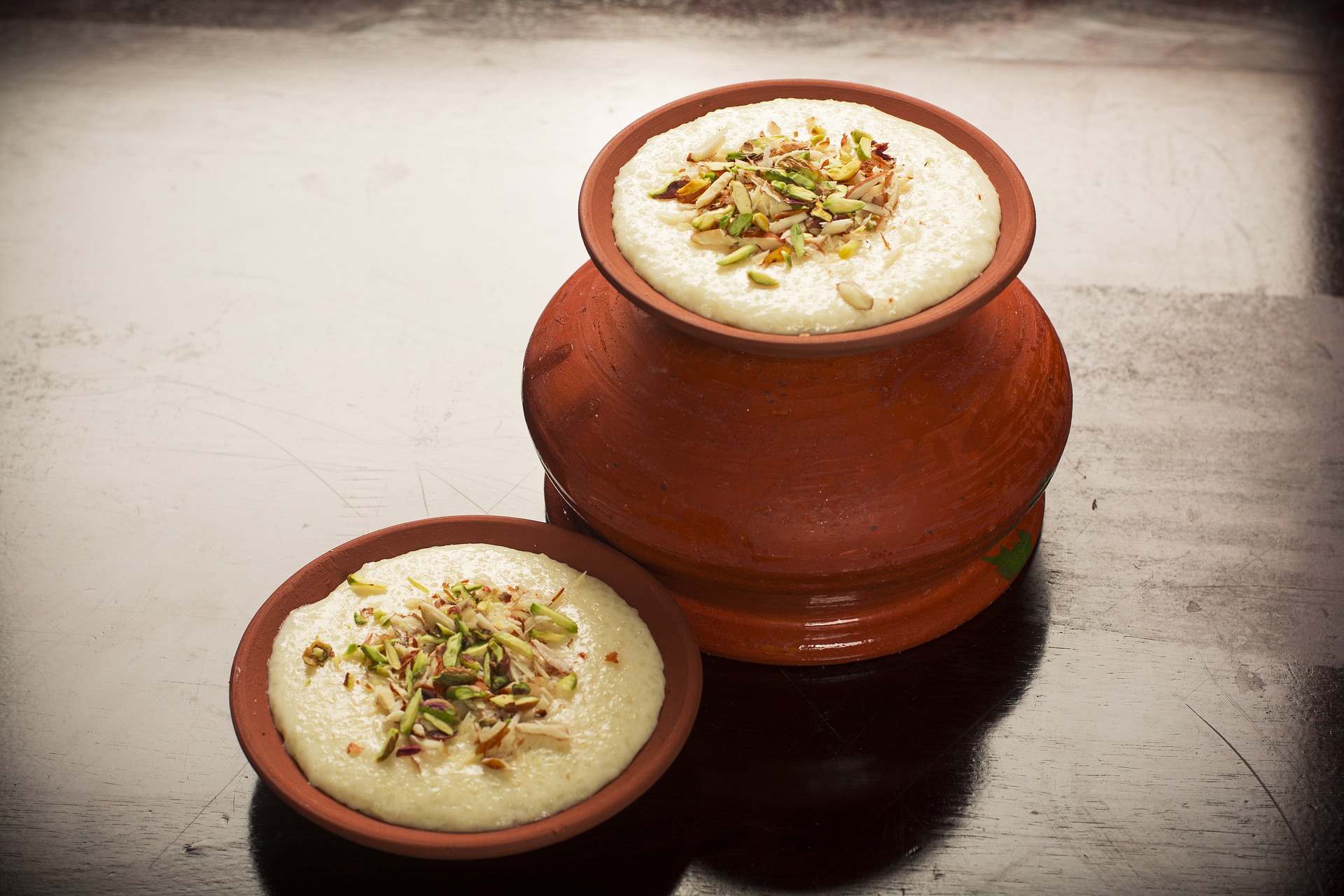 course for Kṛṣṇa, but if the milk becomes spoiled in some way, she will be very upset. She thinks, “If Kṛṣṇa takes this milk, He will live a long, healthy life. From this milk, I will make sandeśa, rabarī, khīra, malpura, and so many delectable preparations to feed Kṛṣṇa.” At other times, when Mother Yaśodā makes Kṛṣṇa some beautiful new silken clothes and after dressing Him in them He goes outside and plays in some nearby mud, then, seeing Him, Yaśodā says, “Hey! Look what you’ve done to Your new clothes!” Then Kṛṣṇa thinks, “Does Mother have more love for Me, or for My clothes?” Therefore devotees may sometimes show even more regard for Kṛṣṇa’s paraphernalia than for Kṛṣṇa Himself; that is one symptom of prema. And what are Kṛṣṇa’s dearest possessions but His devotees? This is why even after performing bhajana for thousands of lifetimes those who don’t respect His devotees will attain absolutely nothing.
course for Kṛṣṇa, but if the milk becomes spoiled in some way, she will be very upset. She thinks, “If Kṛṣṇa takes this milk, He will live a long, healthy life. From this milk, I will make sandeśa, rabarī, khīra, malpura, and so many delectable preparations to feed Kṛṣṇa.” At other times, when Mother Yaśodā makes Kṛṣṇa some beautiful new silken clothes and after dressing Him in them He goes outside and plays in some nearby mud, then, seeing Him, Yaśodā says, “Hey! Look what you’ve done to Your new clothes!” Then Kṛṣṇa thinks, “Does Mother have more love for Me, or for My clothes?” Therefore devotees may sometimes show even more regard for Kṛṣṇa’s paraphernalia than for Kṛṣṇa Himself; that is one symptom of prema. And what are Kṛṣṇa’s dearest possessions but His devotees? This is why even after performing bhajana for thousands of lifetimes those who don’t respect His devotees will attain absolutely nothing.
Therefore Yaśodā went to protect the milk so that it would not be wasted, and when Kṛṣṇa broke the butter pot, she ran after Him to correct Him. Lifting her stick, she said, “All right – now I will hit You!”
Frightened, Kṛṣṇa replied, “Mother, don’t hit Me!”
“Tell me then – why did You break the pot?”
“I didn’t break it!”
“Then who did?”
“You must have accidentally broken it as you ran by! You were not completely to your senses!”
Then Yaśodā became more angry and said, “And why are You stealing? There are no thieves on my side of the family! You are the only thief in our family!” Again Kṛṣṇa ran off, and again she lifted up her stick and chased Him. As she was running, her hair loosened, and she became fatigued, but she was determined to catch Him. Finally with the help of some of the household servants He was caught, and she brought Him inside the house. “Now shall I hit You, restless friend of the monkeys? You steal from the homes of others as well as Your own house! Do You think that’s good?”
Kṛṣṇa replied, “Mother, don’t hit Me! There is no purpose in hitting Me!”
So she put down the stick and said, “All right, I will bind You instead.” So she took the rope from her loosened hair and tried to bind Him. His thin waist was nicely decorated with golden ornaments, and when she applied the rope to it, she found that the rope was short. She said to the gopīs, “Bring more rope!” But even upon more rope being added, Kṛṣṇa still could not be bound. Yogamāyā saw that, “My master does not desire to be bound now.” Therefore Kṛṣṇa’s waist remained the same size, but by the influence of Yogamāyā the rope was always two finger lengths short. Because she still did not have sufficient determination, Yaśodā couldn’t wrap it all the way around even once, and everyone was astonished.
What difficulty should there be in binding such a thin waist? It is like those of us who are presently practising sādhana-bhajana. In general we believe that Bhagavān is very merciful, but sometimes our faith becomes weak. “Is there really so much śakti in the name of Bhagavān, or not? Can it really bestow bhakti, or not? Will I ever meet Bhagavān?” If in the midst of the process of chanting harināma all of one’s difficulties are not eradicated, he may begin to think, “Is Bhagavān there, or not?” He may feel that he has attained nothing, that his unhappiness has not been mitigated, his poverty has not been eradicated, and after doing bhajana his whole life, he may merely die crying in disappointment. Rather, we should continue chanting with such good faith that we will always think, “My endeavour will certainly be successful.”
But sometimes our determination is not firm, and many sādhakas fall into the trap of again becoming involved in enjoying māyā, thinking, “I will work hard, make lots of money, build a house and live comfortably.” However they forget that one day they will have to die and leave it all behind. At first Yaśodā thought that she would quickly wrap the rope around Kṛṣṇa’s waist, but did it happen? Similarly, when we first take up devotional life, we think that attaining Bhagavān will not be difficult, but recognising the reality of it, we should never become despondent. Many devotees become despondent, but we should always remain eager and determined.
After some time, the gopīs were wonderstruck, and especially Yaśodā’s astonishment knew no limit as they saw 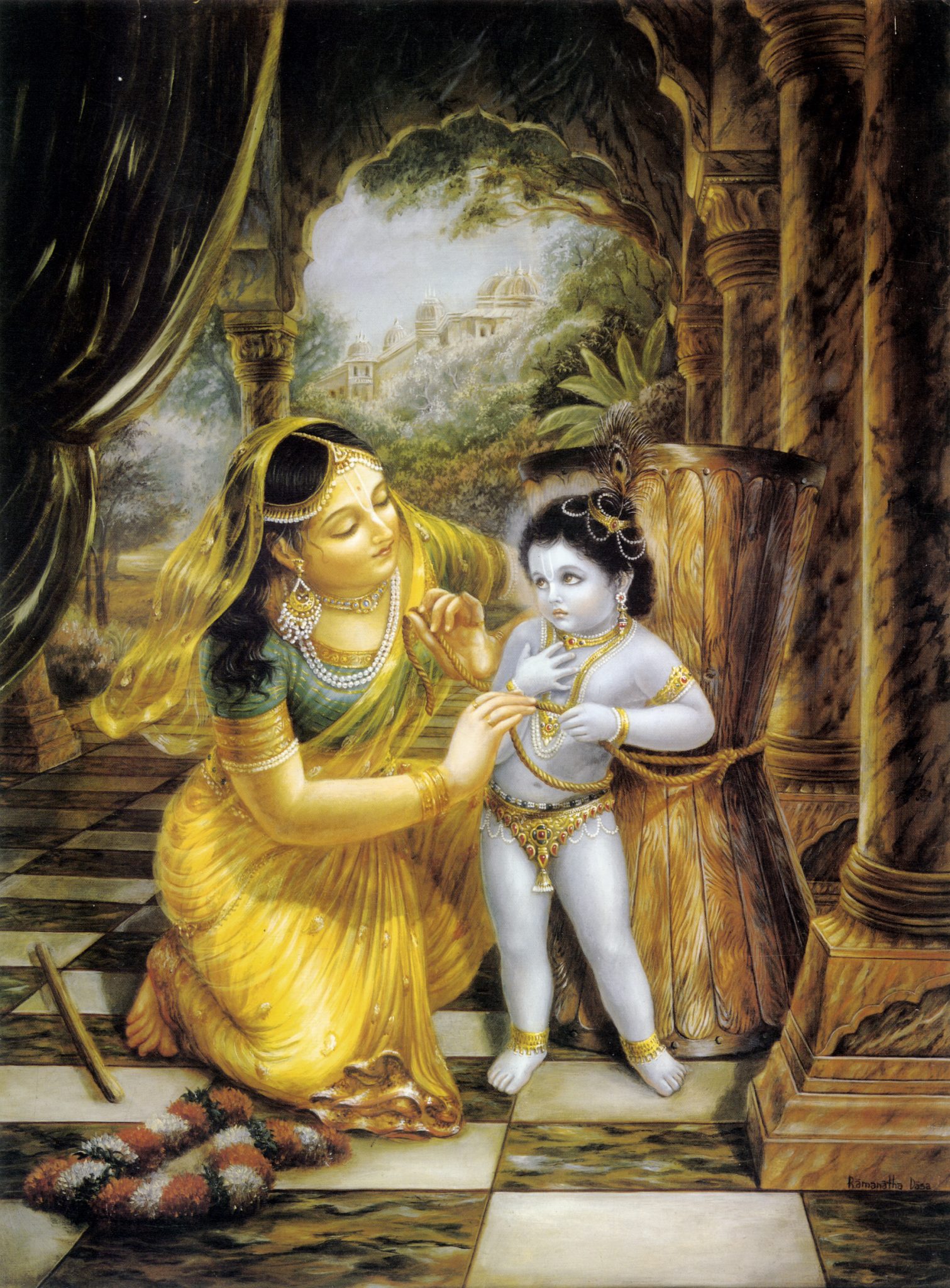 that thousands of ropes had been joined together, but still, this small child could not be bound. Yaśodā thought, “From early morning until now I have been trying to bind Him! The rope has become so long, and still it won’t wrap around Him even once. Every time it is two finger lengths short. Not one, three, four or five-finger lengths short, but every time, it is precisely two-finger lengths short! Why is this?”
that thousands of ropes had been joined together, but still, this small child could not be bound. Yaśodā thought, “From early morning until now I have been trying to bind Him! The rope has become so long, and still it won’t wrap around Him even once. Every time it is two finger lengths short. Not one, three, four or five-finger lengths short, but every time, it is precisely two-finger lengths short! Why is this?”
There were two reasons for the rope being short. First, Yogamāyā saw that Kṛṣṇa did not desire to be bound, so Kṛṣṇa’s sanction was not present, and second, there was not sufficient eagerness in Yaśodā. There is the mercy of Kṛṣṇa and a devotee’s eagerness for bhajana. When they both come together, one will meet Bhagavān and overpower Him with prema. As long as Yaśodā was not sufficiently eager, she could not bind Him. But then she became more determined, thinking, “This is my own small child, and standing before all of my friends I am unable to bind Him? Now I will certainly bind Him, or else I might as well give up my life!” She began perspiring and her face became red, and kṛpayāsīt sva-bandhane – seeing her endeavour to bind Him, Kṛṣṇa’s heart melted. The influence of Yogamāyā withdrew, and at last He allowed her to bind Him.
Sanātana Gosvāmī says here that there are two types of devotees: those who desire to attain Bhagavān by the  practice of sādhana-bhajana, and those who rely solely on Kṛṣṇa’s mercy. Mahāprabhu said that both are necessary. Kittens don’t need to make any effort; the cat feeds them and nurtures them and carries them everywhere in her mouth, and all the kittens do all day and night is merely cry “meow, meow”. But baby monkeys have to hold onto their mothers themselves; otherwise they will be finished. When the mother is ready to cross from one roof or tree to another, at once the baby monkey runs over and holds on around her stomach or on her back and is carried across. She never grabs the babies herself, and if they don’t grab onto her, she goes without them, thinking, “What good are such useless offspring anyway?”
practice of sādhana-bhajana, and those who rely solely on Kṛṣṇa’s mercy. Mahāprabhu said that both are necessary. Kittens don’t need to make any effort; the cat feeds them and nurtures them and carries them everywhere in her mouth, and all the kittens do all day and night is merely cry “meow, meow”. But baby monkeys have to hold onto their mothers themselves; otherwise they will be finished. When the mother is ready to cross from one roof or tree to another, at once the baby monkey runs over and holds on around her stomach or on her back and is carried across. She never grabs the babies herself, and if they don’t grab onto her, she goes without them, thinking, “What good are such useless offspring anyway?”
So which is the primary consideration here concerning sādhana or kṛpā, mercy? Mahāprabhu said that both are essential. No one can actually bind Bhagavān by the strength of their sādhana, but by endeavouring more and more until such great determination comes that all of one’s bodily needs and worldly attachments are forgotten, then Bhagavān’s heart will melt and He will bestow special mercy. Bhagavān’s kṛpā is upon all living entities at all times, but not that special mercy by which He can actually be bound. He only gives that upon seeing the intense endeavour of His devotees, like the renunciation of Raghunātha dāsa Gosvāmī. How did he perform bhajana, day and night? The Six Gosvāmīs would live outdoors in the jungle, such as at Nandagrāma or near Pāvana- sarovara, where a cool breeze is constantly blowing. They would reside beneath trees, and nearby were snakes, scorpions and many different kinds of jungle animals. They ate very little and performed extremely strict bhajana.
sarovara, where a cool breeze is constantly blowing. They would reside beneath trees, and nearby were snakes, scorpions and many different kinds of jungle animals. They ate very little and performed extremely strict bhajana.
By that kind of bhajana one can meet Bhagavān, but where is such strictness and intensity in our bhajana? With great comfort, we eat and drink, and we have quilts, pillows, and shawls. On cold days we have plenty of hot food to eat, and there is never any deficiency in our sleeping. Therefore Bhagavān’s mercy is upon us, the mercy of the Vaiṣṇavas is upon us, but it is our misfortune that we don’t have the same intensity as the Six Gosvāmīs.
Wonderstruck and experiencing ecstatic symptoms in his description of the glories of Yaśodā, Śukadeva Gosvāmī experienced these feelings arising in his heart:
nemaṁ viriñco na bhavo
na śrīr apy aṅga-saṁśrayā
prasādaṁ lebhire gopī
yat tat prāpa vimuktidāt
Śrīmad-Bhāgavatam (10.9.20); Bṛhad-bhāgavatāmṛta (2.7.130)
[Neither Lord Brahmā, nor Lord Śiva, nor even the goddess of fortune, who is always the better half of the Supreme Lord, can obtain from the Supreme Personality of Godhead, the deliverer from this material world, such mercy as received by mother Yaśodā.]
Neither Brahmā, Śiva or even Lakṣmī-devī – who eternally resides at Kṛṣṇa’s chest in the form of a golden line – have ever received as much mercy as Yaśodā did from He who is the bestower of liberation.
Although being Bhagavān’s own son, still, even Brahmā didn’t attain as much mercy as Yaśodā did. Brahmā was born from the lotus of Bhagavān’s navel. Generally a father is most munificent to his son regardless of the son’s nature – whether he is a criminal or whatever. Usually, the son is made the father’s heir in all respects, but even such a highly qualified son as Brahmā did not receive the mercy which Yaśodā did. Coming to Vraja, Brahmā saw, “First this offender Aghāsura tried to swallow Kṛṣṇa, and then I saw Kṛṣṇa give liberation to him! I saw a light leave Aghāsura’s body, fly up into the sky, and then merge into Kṛṣṇa’s feet! That was no ordinary light; it was certainly Aghāsura’s soul!”
Many were not able to recognise the divine symptoms of Kṛṣṇa and only saw Him as an ordinary human being. As Kṛṣṇa prepared to leave this world and return to Goloka in His form as Dvārakādhīśa, what did the ordinary people see? That Kṛṣṇa was shot by a hunter’s arrow, He began to bleed, and He died right there. Others saw a light come out of Kṛṣṇa’s body and go into the sky. Brahmā, Śaṅkara and others saw Kṛṣṇa return to Goloka in His selfsame form as His eternal associates offered Him prayers. And what did the higher devotees of Dvārakā see? That Kṛṣṇa didn’t go anywhere; He always remains in Dvārakā. So, according to their different levels of inner development, people saw Him in different ways.
When Brahmā saw Kṛṣṇa’s pastime of giving liberation to Aghāsura, he became very astonished and thought, “How can I see more pastimes like this?” Meanwhile, Kṛṣṇa remembered that He wanted Himself to become all of those cowherd boys and calves, so here was the opportunity to accomplish all of His objectives in one pastime. In this pastime He could marry all of the gopīs, because if He had kept relationships with them otherwise, the people of mundane consciousness would have criticised Him. Next, Yogamāyā sent inspiration 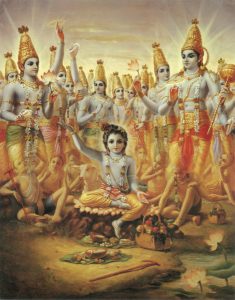 into the heart of Brahmā, and he thought, “Let me see what will happen next if I steal the cowherd boys and calves.”
into the heart of Brahmā, and he thought, “Let me see what will happen next if I steal the cowherd boys and calves.”
In the end, seeing how Kṛṣṇa Himself expanded into all of the cowherd boys and calves, how all of their sticks and blankets and everything appeared as four-armed Nārāyaṇas, and how so many demigods were offering them prayers, he became wonderstruck. He immediately fell down like a stick at Kṛṣṇa’s feet. Then he looked again, and everything had disappeared, and only the original form of Kṛṣṇa remained, standing in His threefold-bending posture and smiling.
Na-bhavaḥ – Śaṅkara also did not receive as much mercy as Yaśodā did. And who is Śaṅkara? He and Hari are one and the same soul. For the purpose of showing the ideal standard of worshipping Śaṅkara to the residents of this world, Kṛṣṇa once worshipped Śaṅkara. Brahmā may become offended, but Śaṅkara never accepts any offence. Kṛṣṇa assigns Śaṅkara very difficult tasks, even up to bewildering the jīvas in his incarnation as Śaṅkarācārya and Śaṅkara always fulfils those tasks. Therefore he is undoubtedly the recipient of Kṛṣṇa’s mercy but not the prasāda, the special mercy that is spoken of in this verse.
Na Śrīḥ – and not even Lakṣmī, who always resides at the Lord’s chest and who performed austerities and pūjā at Baelvana, received such mercy as Yaśodā did. Vimuktidāt – Kṛṣṇa is the giver of liberation. He bestows upon some the destination of Vaikuṇṭha, and upon others even the destination of Goloka Vṛndāvana, but to Yaśodā He gave that special mercy which was not given to anyone else and by which He Himself becomes bound.
Source: Purebhakti.com
Image(s) made possible by Pixabay.com, Krishnapath.org and/or Bhaktiart.net
Unless indicated differently, all verse translations and quotes are from the books by Śrīla Prabhupāda (Vedabase.com)